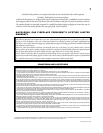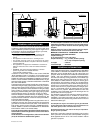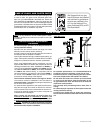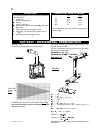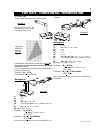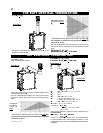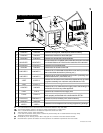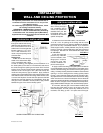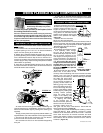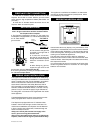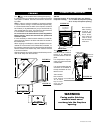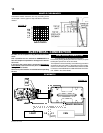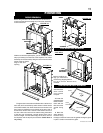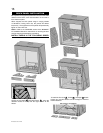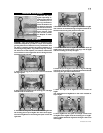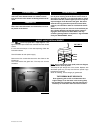
11
W415-0614 / A / 07.24.07
7. Using the 10” diameter fl exible aluminium liner, apply
sealant, slide a minimum of 2” over the fi replace combustion
air collar and secure with 6 #8 screws.
1. Move the fi replace into position.
2. Fasten the roof support to the roof
using the screws provided. The roof
support is optional. In this case the
venting is to be adequately supported
using either an alternate method
suitable to the authority having juris-
diction or the optional roof support.
(Figure 20)
3. Stretch the inner aluminum
fl ex liner to the required length.
Slip the liner a minimum of 2” over the inner sleeve of the air
terminal connector and secure with 6 #8 screws. Seal using
a heavy bead of the high temperature sealant. (Figure 21)
4. Repeat using the outer aluminum
fl ex liner. (Figure 21)
5. Thread the air terminal connector
/ liner assembly down through
the roof. The air terminal must be
located vertically and plumb. Attach
the air terminal connector to the
roof support, ensuring that the top
of the air terminal is 16” above the
highest point that it penetrates the
roof. (Figure 22) If the attic space
is tight, we recommend threading
the Wolf Steel vent pipe collar or
equivalent loosely onto the air
terminal assembly as it is passed
through the attic.
6. Remove nails from the shingles,
above and to the sides of the
chimney. Place the fl ashing over the air terminal connector
leaving a min. 3/4” of the air terminal connector showing
above the top of the fl ashing. Slide the fl ashing underneath
the sides and upper edge
of the shingles. Ensure that
the air terminal connector is
properly centred within the
fl ashing, giving a 3/4” margin
all around. Fasten to the roof.
Do not nail through the lower
portion of the fl ashing. Make
weather-tight by sealing with
caulking. Where possible,
cover the sides and top
edges of the fl ashing with
roofi ng material. (Figure 22)
7. Aligning the seams
of the terminal and air
terminal connector, place the
terminal over the air terminal
connector making sure the
liner goes into the hole in the terminal. Secure with the
three screws provided. (Figure 22)
8. Apply a heavy bead of weatherproof caulking 2 inches
above the fl ashing. Note: Maintain a minimum 2” space
between the air inlet base and the storm collar. Install the
storm collar around the air terminal connector and slide
down to the caulking. Tighten to ensure that a weather-tight
seal between the air terminal connector and the collar is
achieved. (Figure 22)
CAULKING
TERMINAL
EXTENSION
PLATE
SCREWS
#10x2½"
10" FLEX
SEALANT
HI-TEMP
2" OVERLAP
PIPE
8"FLEX
PIPE
Note: Direct vent terminals shall not be recessed into a
wall or siding.
1. Cut or frame a hole in an exterior wall with a minimum round
or square opening of 14
1
/
2
” W x 14
1
/
2
” H. Secure the fi restop
spacer over the opening to the interior wall.
2. Stretch the 8” diameter fl exible aluminum liner to the re-
quired length taking into account the additional length needed
for the fi nished wall surface. Slip the liner a minimum of 2”
over the inner sleeve of the air terminal and secure with 6 #8
screws. Apply a heavy bead of the high temperature sealant
(W573-0007 not provided).
3. Using the 10” diameter fl exible aluminum liner, slide over
the outer combustion air sleeve of the air terminal and secure
with 6 #8 screws. Seal as before.
FIGURE 19
Use only approved aluminum flexible liner kits
marked:
“Wolf Steel Approved Venting” as
identified by the stamp only on the
10” outer liner.
USING FLEXIBLE VENT COMPONENTS
HORIZONTAL AIR TERMINAL INSTALLATION
VERTICAL AIR TERMINAL INSTALLATION
FIGURE 18
For safe and proper operation of the fireplace, follow
the venting instructions exactly.
All inner exhaust and outer intake vent pipe joists may
be sealed using either Red RTV high temp silicone seal-
ant or Black high temp Mill Pac with the exception of the
fireplace exhaust flue collar which must be sealed using
Mill Pac (not supplied).
8
10
10
8
10
ROOF SUPPORT
Figure 20
DO NOT
CLAMP THE FLEXIBLE
ALUMINIUM LINER.
Figure 21
INNER FLEX
LINER
OUTER
FLEX
LINER
INNER
SLEEVE
HIGH
TEMPERATURE
SEALANT
AIR
TERMINAL
CONNECTOR
STORM COLLAR
FLASHING
CAULKING
2”
AIR INLET
BASE
WEATHER
SEALANT
c
4. Insert the liners through the fi restop maintaining the
required clearance to combustibles. Secure to the exterior
wall and make weather tight by sealing with caulking (not
supplied).
5. Apply a heavy bead of the high temperature sealant, not
supplied with the unit, to the inside of the 8” liner approximately
1” from the end. Slip the liner a minimum of 2” over the fi re-
place vent collar and secure with 6 #8 screws.
6. If more than one liner is run we recommend supporting
every 5ft.



